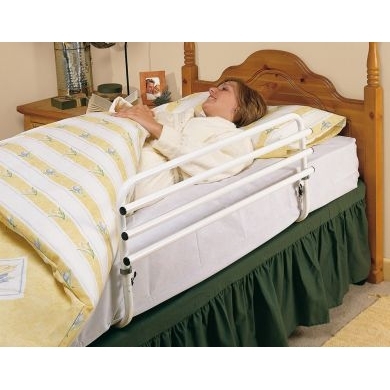We all want to be able to sleep well don't we.
Sleep problems are common for people with dementia. Some may find they are more tired because extra effort and concentration are required to do things which once came naturally, while others are simply less active and need less sleep as a result. Some may sleep during the day and stay awake at night, while others may find it difficult to differentiate between day and night.
Whatever the problem, the bedroom should be a welcoming space, decorated and fitted out to provide comfort, support independence and promote dignity. Ensuring that a person feels at ease in their bed will help them to enjoy a good night’s sleep.
Helping them to find the bedroom door could be the first step, even in a home in which they have lived for years, so the use of a high visibility sign with a picture of a bed is a sensible option. In a care setting, the sign could also include a photograph of the resident to aid room recognition.
Safety is a key consideration, so helping people to get in and out of bed easily and reducing the risk of falls are key considerations. People with dementia are also liable to wander, so sensors are available to alert a carer if the person gets out of bed or leaves the room.
Other developments in design and technology can help also help to improve the bedroom environment for people with dementia. We recommend that you contact an occupational therapist for more information.
Pillows can make all the difference
A special pillow moulded from polyurethane foam could be the route to a good night's sleep. CLICK HERE
Overbed/chair Tables and Trays for those who cant leave their bed
Use a specially designed tray to fit across a bed or carry food, drink and other household items safely. CLICK HERE
Bedroom Supports and Aids for a more comfortable experience
We offer a range of products to help people sit or lie more comfortably in bed. Backrests and bed wedges are a quick and simple solution, while electrically operated mattress elevators gently raise and lower the head of the mattress to increase comfort for the person lying down and help them to sit up.
Bed Rails and Protection mean you can keep someone safe
Bed rails fit on the side of a bed so that a person who is unsteady on their feet can hold on for support when getting in or out of the bed. Bedside rails and bumpers help to protect the person lying down if they are at risk of falling out, while bedside mats are designed to cushion the fall if they do happen to fall. CLICK HERE
Bedroom Signage helps with finding the right room
A high visibility sign with a name and photograph will help the person with dementia find the way to their own room, especially in a care home corridor where all doors may look the same. CLICK HERE
Urinals make going easier
Ideal for wheelchair users or those confined to bed, urinals are available to suit both men and women. CLICK HERE

.png)

